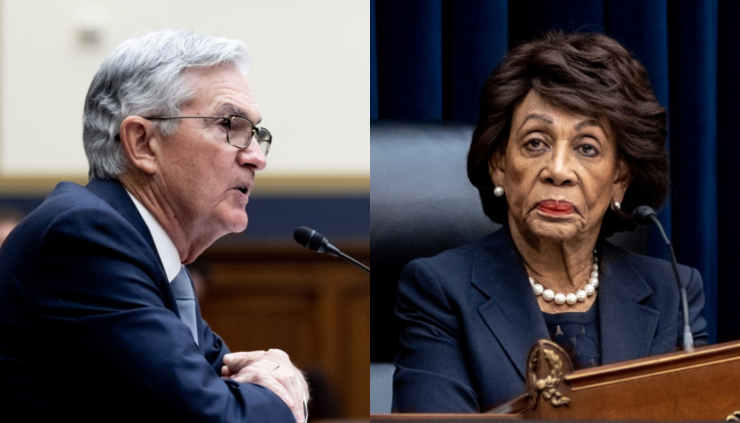Lawmakers on the House Financial Services Committee clashed over the five stalled Federal Reserve nominees during an appearance Wednesday by one of those picks — Fed Chairman Jerome Powell.
While House members play no part in confirming nominees, the partisan exchange was part of Democrats’ building pressure on Senate Republicans to stop blocking votes on President Biden’s nominations for the central bank. It also was perhaps a prelude to Powell’s appearance before the Senate Banking Committee scheduled for Thursday.
Powell — who is up for renomination as chairman — largely dodged questions on the confirmation process, saying that he doesn’t “want to comment directly or indirectly” as he awaits the Senate's vote.
“I prefer not to get into that process, other than as a nominee,” he said.
That didn’t stop Maxine Waters, a California Democrat who chairs House Financial Services, from making several pointed comments about the confirmation fight. After Rep. Pete Sessions, R-Texas, asked about how lawmakers could aid the central bank’s aims, Waters quipped that he “could help Mr. Powell by asking your friends on the Senate side to confirm his appointment.”

“Senate Republicans have chosen to unilaterally block [Powell’s] confirmation … and the historic confirmation of diverse and highly qualified nominees to the board of governors, leaving key leadership positions at the Federal Reserve vacant when it is tackling an array of economic issues, including those arising from Russia’s invasion of Ukraine,” Waters said in her opening remarks. “This will undermine our recovery from the pandemic and place our economy and financial stability at risk.”
Rep. Pat McHenry of North Carolina, the panel’s ranking Republican, replied: “This is the House. The Senate does nominations. If we wish to have an opinion and direct the Senate, we should go run for the Senate.”
News outlets reported this week that Democrats on the Senate Banking Committee
Calls for Republicans to move forward on the nomination have grown in recent days, with Senate Banking Chairman Sherrod Brown, D-Ohio, asking Republicans to act in a floor speech Tuesday, and Biden
“I implore my Republican colleagues: Let’s do our jobs,” Brown said. “Let’s come together and get these nominees on the Fed.”
Powell is one of five nominees currently held up in a Senate bottleneck as Republicans delay a vote on their confirmation over concerns on the nomination of Sarah Bloom Raskin as the Fed’s vice chair for supervision. The nominations of Lael Brainard for vice chairman along with Lisa Cook and Philip Jefferson for the central bank’s board, are also in limbo.
While most of the hearing Wednesday focused largely on the Fed nominations and monetary policy, Powell touched on a few banking-related issues, including climate risk, Russian sanctions, Community Reinvestment Act reform and the possibility of a central bank digital currency.
Powell reiterated that the CRA revamp the Fed is pursuing with the Office of the Comptroller of the Currency and the Federal Deposit Insurance Corp. is coming “soon,” but he declined to offer a specific date. “It feels like we’re getting very close,” he said.
He addressed the Fed’s progress on a central bank digital currency, saying that the central bank would “invest a fair amount of time and expertise” into considering one, and into deploying it if “appropriate.”
Amid
Further, the Ukraine-Russia conflict “underscored” the need for Congress to help create a regulatory framework for cryptocurrency, he said, responding to a question on whether Russia could use cryptocurrency to bypass sanctions.
Powell said that the U.S. economy and its financial institutions don’t have a large overlap with Russia’s, and that it’s “gotten smaller and smaller in recent years.” He did note that there could be “unintended and unexpected effects” from actions such as cutting Russian banks off from the Swift financial messaging system, but he didn’t offer examples.
Republican opposition to Raskin has largely revolved around her views on the role of climate risk in bank supervision. Raskin also criticized a Fed decision in the early pandemic to
Powell also reassured some Republican lawmakers that the way the Fed considers climate risk wouldn’t involve traditional stress tests to set capital levels.
“The idea is more to allow financial institutions and also regulators to understand better the extent to which, and the ways in which, climate financial risks have any implications for the banks,” Powell said.
Staff writer Brendan Pedersen contributed to this article.





